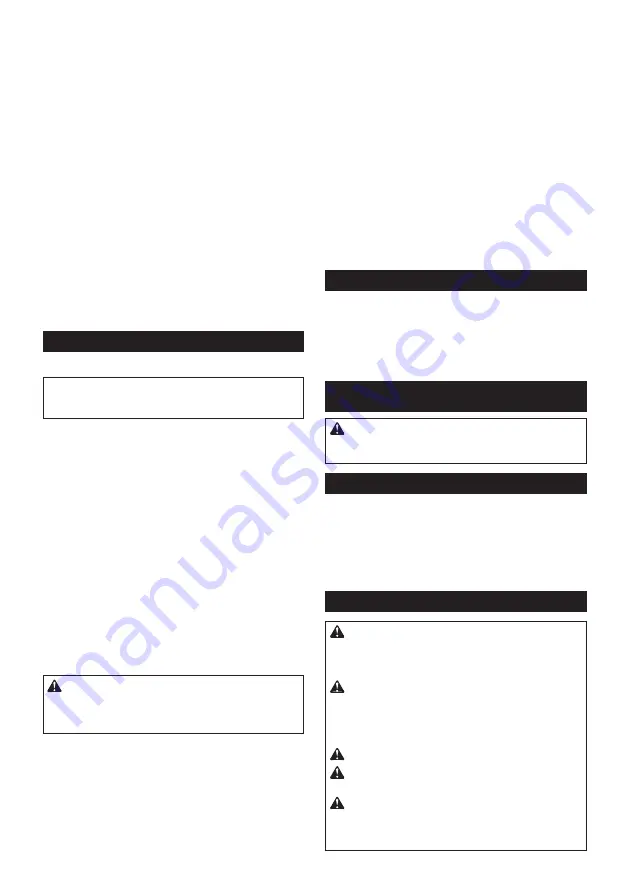
10 ENGLISH
To remove the groove cutter blade, perform following
steps:
1.
Lie down the tool as the motor housing and the
base touching the ground. Then insert the hex wrench
into the hex hole, push it in, and open the blade case
door by turning the hex wrench.
►
Fig.14
2.
Press the shaft lock fully so that the blade does
not revolve, then loosen the hex bolt counterclockwise
with the wrench.
►
Fig.15:
1.
Shaft lock
2.
Hex bolt
3.
Remove the hex bolt, outer flange and blade.
►
Fig.16:
1.
Hex bolt
2.
Outer flange
3.
Groove cutter
blade
4.
Inner flange
To install the blade, follow the removal procedure in
reverse.
Be sure to tighten the hex bolt clockwise
securely.
And close the blade case door after installing
the blade.
When changing blade, make sure to also clean the
guard of accumulated sawdust and chips as discussed
in the Maintenance section. Such efforts do not replace
the need to check guard operation before each use.
Using circular saw blade
Optional accessory
NOTE:
In case using circular saw blade, the skirt is
not needed and it structually can not be installed.
Remove the skirt when using the circular saw blade.
To install the circular saw blade (optional accessory),
perform the following steps:
1.
Remove two bolts, and remove the skirt.
►
Fig.17:
1.
Skirt
2.
Remove the groove cutter blade.
3.
Slide in the circular saw blade from the opening
which the skirt had covered.
4.
Install the circular saw blade in the same way as
the groove cutter blade. And close the blade case door
after installing the blade.
►
Fig.18:
1.
Hex bolt
2.
Outer flange
3.
Circular saw
blade
4.
Inner flange
5.
Adjust depth of cut by turning the depth adjusting
knob.
Rip fence (guide rule)
Optional accessory
CAUTION:
Do not use the rip fence with the
groove cutter blade.
Use the rip fence only when
using the tool with the circular saw blade (optional
accessory).
►
Fig.19:
1.
Rip fence (guide rule)
The handy rip fence allows you to do extra-accurate
straight cuts. Simply slide the rip fence up snugly
against the side of the workpiece and secure it in
position with the screws on the front and the back of
the base. It also makes repeated cuts of uniform width
possible.
Overturning the rip fence (guide rule) also works as a
sub base for the tool.
Stopper for 2 to 3 mm depth of
cut when using circular saw blade
(optional accessory) and guide rail
(optional accessory)
►
Fig.20:
1.
Stopper
2.
Red mark
This tool has the stopper for 2 to 3 mm depth of cut
on the gear housing aside the rear handle when using
guide rail.
Splinter on the workpiece can be avoided by making a
pass of the 2 to 3 mm first cut and then make another
pass of usual cut.
First, push in the stopper toward the circular saw blade
for obtaining 2 to 3 mm depth of cut.
Then pull the button back for performing free depth of
cut.
Make sure that the stopper is released and the red mark
can be seen for groove cutting operation.
Connecting a vacuum cleaner
For groove cutting operation, connect a Makita vacuum
cleaner to your tool.
Connect a hose of the vacuum cleaner to the dust port.
►
Fig.21:
1.
Vacuum cleaner
2.
Dust port
OPERATION
CAUTION:
Always use a front grip and rear
handle and firmly hold the tool by both front grip and
rear handle during operations.
Guide rail
Optional accessory
Always use the guide rail for groove cutting operation.
Place the tool on the rear end of the guide rail.
Turn two adjusting screws on the tool base so that the
tool slides smoothly without a clatter.
►
Fig.22:
1.
Adjusting screws
Groove cutting
CAUTION:
Be sure to move the tool forward
in a straight line gently.
Forcing or twisting the tool
may result in overheating the motor and dangerous
kickback, possibly causing severe injury.
CAUTION:
Never approach any part of your
body under the tool base when section cutting,
especially at starting.
Doing so may cause serious
personal injuries. The blade is exposed under the tool
base.
CAUTION:
Use eye protection to avoid injury.
CAUTION:
For groove cutting operation,
always connect the tool to a vacuum cleaner.
CAUTION:
Hold the tool firmly. The tool is
provided with both a front grip and rear handle.
Use both to best grasp the tool.
If both hands are
holding saw, they cannot be cut by the blade.
Summary of Contents for CA5000
Page 2: ...Fig 1 Fig 2 Fig 3 Fig 4 Fig 5 Fig 6 1 2 Fig 7 1 Fig 8 2 ...
Page 3: ...1 4 2 3 Fig 9 2 1 Fig 10 1 Fig 11 2 1 3 Fig 12 1 Fig 13 Fig 14 2 1 Fig 15 1 2 3 4 Fig 16 3 ...
Page 4: ...1 Fig 17 1 2 3 4 Fig 18 1 Fig 19 2 1 Fig 20 1 2 Fig 21 1 Fig 22 Fig 23 1 Fig 24 4 ...
Page 5: ...1 Fig 25 1 Fig 26 1 Fig 27 5 ...
Page 78: ...78 ...
Page 79: ...79 ...











































